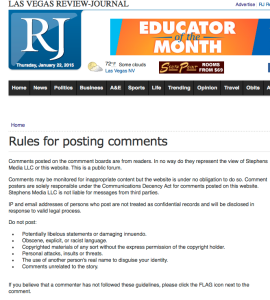The Las Vegas Review-Journal was past due in taking down its reader comments yesterday.
Frankly, they had become worse than a joke. They were the drunk uncle at a family reunion who didn’t care that we ignored his racist, homophobic, sexist rants. Somebody needed to shut him up.
 It has been clear for a long time that the comment section under Review-Journal stories was a place to avoid. For every interesting remark, there usually were at least three offensive, tasteless and rude comments.
It has been clear for a long time that the comment section under Review-Journal stories was a place to avoid. For every interesting remark, there usually were at least three offensive, tasteless and rude comments.
Some days, it seemed like the same three people were just copy-and-pasting their words from day to day, story to story. The net effect was to drive away people who could contribute to the discussion.
“We aren’t asking our commenters to agree with every story we post or with every commenter who came before them,” reads the newspaper’s explanation. “But we cannot ignore that certain comments and behaviors on our site make people feel unwelcome, not because they offer a differing viewpoint but because they’re violent, threatening or sexually explicit.”
Newspapers have had a longstanding tradition of publishing reader comments as Letters to the Editor. For some, it was the best-read section.
That didn’t happen by accident, though. Letters had to encouraged, curated, edited.
When newspapers began adding instant-comment areas to their online news stories and editorial pieces, I thought it was a great thing. What a terrific opportunity to get instant response to your work, to receive clarifications and amplifications.
This was probably 15 years ago, and it didn’t take long for people to wonder if that was such a good idea. Nasty comments, libelous accusations, stuff that was intentionally untrue — the kind of discourse that I would keep out of Letters to the Editor, as best I could — started showing up within days. Clearly, somebody had to moderate the discussion.
In those days, the advice from attorneys was either to allow a comment to be published as it was written, or to delete it. They told us not to edit them, because that made the newspaper responsible for the comments. As we quickly found out, we just couldn’t keep up. Holding comments until somebody could approve them didn’t work, as it went against the whole notion of immediate feedback. And it would be a 24-hour job.
The Review-Journal acknowledged all that in its explanation. As it noted, many struggle with the same problem.
On the other hand, as they like to say over on the sales side, you could look at it as an opportunity. It’s a valuable resource — not only the fostering of public discussion on topics of the day but the ability to draw in experts and sources with insight who contribute to the community’s knowledge. After all, the whole notion is a marketplace of ideas in which the best inevitably float to the top.
If you’re like me, you regularly visit sites with robust and intelligent reader discussions. They can be the best thing about a site. I return to boingboing because the comments are often written by people who know far more about a topic than the writer. And, I admit, I go to reddit because the comment threads — frequently bizarre, vulgar or purposely irrelevant — likely include the wittiest things I read each day.
Reddit has a rabid, active community that relies heavily on moderating itself — through a system of up- and down-votes, but also because a culture has developed to encourage free speech while at the same time refusing to suffer fools and trolls.
Other sites like boingboing spend a great deal of resources on monitoring the comments. It’s more of an internal system of rewarding valuable contributions and disallowing worthless ones.
That’s the approach I encourage the LVRJ and other newspapers to take.
1) Don’t outsource your comments. As explained in this piece by Mat Yurow six weeks ago, this conversation with your readers is valuable. Extremely valuable.
2) Commit the resources. This is easy for me to say, difficult for struggling newspapers to do. But I look back on the advice given by experts many years ago for publishers to invest and innovate in their classfieds, real-estate listings, employment ads and automotive sections. I remember the half-hearted response, if any, by too many to that advice. I see the consequences.
3) Embrace the opportunity. Similar to the sentiments I expressed last week in this post on connecting a newsroom to a community, newspapers have a role to play as leaders. Set the bar high on what to expect in the level of discourse; lower the barriers to participation. Gannett newspapers now refer to their “engagement editors” rather than editorial-page editors. (I’m so old, I first thought they were talking about wedding photos.) It’s a good word: engage.
People want to learn from each other. People want to share their own experience and expertise. They want to be entertained by clever people, and they don’t want to associate with boors.
Create a place where that can happen. Reward the people who contribute the best. Cut out the people who drag it down. It’s not censorship; it’s editing.
It will take work. Inevitably, though, the best ideas will rise to the top.
 Nevada Press Association The best in Nevada journalism since 1924
Nevada Press Association The best in Nevada journalism since 1924
Reblogged this on Nevada State Personnel Watch.